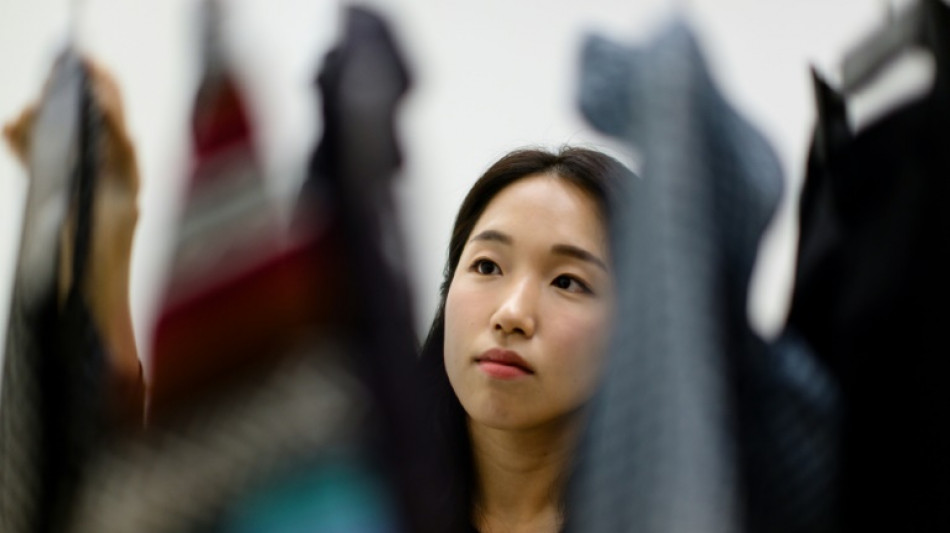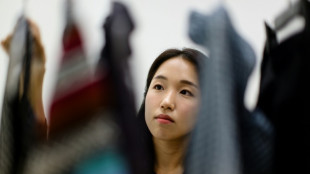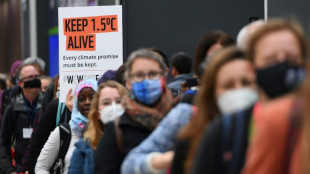
-
 Baltics to cut Soviet-era ties to Russian power grid
Baltics to cut Soviet-era ties to Russian power grid
-
Iraq's famed 'hunchback' of Mosul rebuilt brick by brick

-
 Stock markets stutter as traders weigh China-US trade flare-up
Stock markets stutter as traders weigh China-US trade flare-up
-
Hamas rejects Trump proposal to take over Gaza, move Palestinians

-
 MotoGP champion Martin taken to hospital after Malaysia crash
MotoGP champion Martin taken to hospital after Malaysia crash
-
YouTubers causing monkeys to attack tourists at Cambodia's Angkor Wat

-
 Sweden reels from worst mass shooting in its history
Sweden reels from worst mass shooting in its history
-
India's Modi takes ritual dip at Hindu mega-festival

-
 Nissan shares fall as reports say Honda merger talks off
Nissan shares fall as reports say Honda merger talks off
-
US Postal Service says suspending parcels from China

-
 Toyota announces Lexus EV plant in Shanghai
Toyota announces Lexus EV plant in Shanghai
-
Santander reports record profit for third straight year

-
 No new clothes: S. Korean climate activist targets hyperconsumption
No new clothes: S. Korean climate activist targets hyperconsumption
-
Cummins 'hugely unlikely' for Australia's Champions Trophy bid

-
 Nissan shares plunge as report says Honda merger talks off
Nissan shares plunge as report says Honda merger talks off
-
China holds out hope last-minute deal can avert US trade war

-
 LeBron relishing 'special' Doncic double act
LeBron relishing 'special' Doncic double act
-
Tatum shines as Celtics down Cavs, Lakers thrash Clippers

-
 Myanmar junta bid to sell Suu Kyi mansion flops for third time
Myanmar junta bid to sell Suu Kyi mansion flops for third time
-
Australia bans DeepSeek AI program on government devices

-
 Olympics on horizon as China hosts Asian Winter Games
Olympics on horizon as China hosts Asian Winter Games
-
Tatum, White shine as Celtics down Cavs

-
 Google pledge against using AI for weapons vanishes
Google pledge against using AI for weapons vanishes
-
African football has the platform for historic World Cup success

-
 France prop Gros happy to go 'under radar' for Dupont's benefit
France prop Gros happy to go 'under radar' for Dupont's benefit
-
Bove's future uncertain after heart attack horror as Fiorentina finish Inter clash

-
 Race against time to complete contested Milan-Cortina bobsleigh track
Race against time to complete contested Milan-Cortina bobsleigh track
-
Speed queen Goggia pursuing Olympic dreams with 2026 Winter Games on horizon

-
 Asian markets stutter as traders weigh China-US trade flare-up
Asian markets stutter as traders weigh China-US trade flare-up
-
French PM set to survive no confidence vote

-
 Trump says US will take over Gaza, create 'Riviera of the Middle East'
Trump says US will take over Gaza, create 'Riviera of the Middle East'
-
Google shares slide on spending plans despite sales jump

-
 Honda shares jump on reports it wants Nissan as subsidiary
Honda shares jump on reports it wants Nissan as subsidiary
-
Trump says US will 'take over' Gaza as he welcomes Netanyahu

-
 Cold Nuclear Fusion Ready for Industry
Cold Nuclear Fusion Ready for Industry
-
Netflix drops 'Emilia Perez' star Oscar bid over offensive posts: reports

-
 Sirianni embraces emotions ahead of Chiefs rematch
Sirianni embraces emotions ahead of Chiefs rematch
-
Top climate scientist declares 2C climate goal 'dead'

-
 US Treasury says Musk team has 'read-only' access to payments data
US Treasury says Musk team has 'read-only' access to payments data
-
Leaders 'should respect' wishes of Palestinians to stay in Gaza: Palestinian UN envoy

-
 Paris Saint-Germain, Brest, Dunkerque advance to French Cup last eight
Paris Saint-Germain, Brest, Dunkerque advance to French Cup last eight
-
Simeone brace helps Atletico thrash Getafe, reach Copa del Rey semis

-
 Trump hosts Netanyahu for pivotal Gaza ceasefire talks
Trump hosts Netanyahu for pivotal Gaza ceasefire talks
-
Atletico thrash Getafe to reach Copa del Rey semis

-
 Stocks recover but tariff uncertainty lingers over market
Stocks recover but tariff uncertainty lingers over market
-
Shiffrin to sit out world team combined, dashing Vonn hopes

-
 Mahomes avoids 'G.O.A.T' talk as history beckons
Mahomes avoids 'G.O.A.T' talk as history beckons
-
Undav sends Stuttgart into German Cup final four

-
 Alcaraz battles through in first match since Australian Open
Alcaraz battles through in first match since Australian Open
-
Trump backs jailing Americans in El Salvador if has 'legal right'


No new clothes: S. Korean climate activist targets hyperconsumption
Recovering South Korean shopaholic-turned-climate activist Lee So-yeon used to buy new clothes almost daily -- until a $1.50 winter coat triggered an awakening that stopped her shopping entirely.
While looking at the ultra-cheap padded jacket at an H&M shop in the United States, where she was working at the time, Lee asked herself how any item of clothing could be sold so cheaply.
The 30-year-old embarked on a deep dive into fast fashion production methods and was horrified at the human, social and environmental toll hyperconsumerism is having on the planet -- and on the mental health of women who make and buy cheap clothes.
"I used to buy one new outfit each (working) day of the week," Lee told AFP, adding that each item from major high street retailers would typically cost less than a dollar.
But the reason the clothes are so cheap, Lee learned, is because the women who sew for companies are paid little, while the business model itself is causing significant environmental harm.
Lee stopped buying any new clothes -- and has not purchased a single fast fashion garment since her epiphany around six years ago.
Her much more compact wardrobe consists of used items that she received from friends and family, including a vintage leather jacket that once belonged to her mother.
Unlike fast fashion items, which are often designed to be thrown away after just a few wears, each piece is irreplaceable because it carries a unique story and history, she said.
"Ultimately, the most eco-friendly clothes are the ones already in your wardrobe," said Lee.
- Break the cycle -
Lee now organises clothing swaps with her friends and family, and has written a book to promote the idea of valuing garments for "the story behind it," rather than chasing ephemeral trends.
She is part of a small but growing global movement seeking to promote second-hand clothing and help people -- especially women -- opt out of the cycle of over-consumption.
The app Lucky Sweater provides a platform for users to trade items from their closets with each other, focussing on sustainable brands, founder Tanya Dastyar told AFP.
"We're programmed to believe the only way to express my fashion or show that I'm beautiful or trendy... is new outfits," Dastyar said.
"But you can still be fashionable and feel good and look great and not have to do that," she said, adding that although trading clothes did not have the same quick dopamine hit as making a fast-fashion purchase, it was far more rewarding over time.
The app's growing uptake indicates that people are hungry to shift their relationship with clothing and consumerism, she said.
People realise: "I don't have to follow trends and I can just dress in a way that feels comfortable to me," she said. "Is that like a mass market thing? No. But do I feel like it can be a movement? Yes."
For Lee, breaking the cycle of cheap clothing consumption helped her improve her mental health.
As a teenager, she would worry about what to wear on school trips -- when uniforms were not required -- at least a month in advance and would go shopping to ease her fears.
"I felt a lot of pressure about how others would see me," she told AFP.
But learning about Bangladesh's 2013 Rana Plaza tragedy -- one of the world's worst industrial disasters that killed more than 1,130 garment factory workers, most of them young women -- was a turning point.
The factory workers died making clothes for "women like me", Lee said.
- No second-hand? -
The global fashion industry is one of the most polluting, accounting for up to 10 percent of greenhouse gas emissions, according to World Bank estimates.
Most modern clothes are made of synthetic materials like nylon and polyester, which are essentially plastic and do not biodegrade in landfills, industry data shows.
Keeping clothes out of landfills can help, but in South Korea, many still avoid used garments, said Kim Dong-hyun, who runs a used clothing export factory.
"People often don't look favourably on someone wearing used clothes because they are seen as unwanted items," Kim told AFP, noting he has found dirty diapers and food waste in the collection bins.
South Korea is the fifth largest exporter of used clothing in the world -- and activists say many garments are essentially dumped in developing countries, which lack the capacity to process them.
At Kim's second-hand clothing factory in Paju, outside Seoul, a mechanical claw categorised piles of used clothes to be exported overseas.
"Many people treat the clothing collection bin as just a trash can," Kim said.
O.Brown--AT



